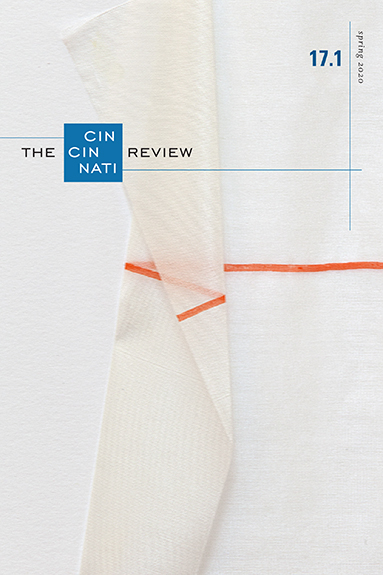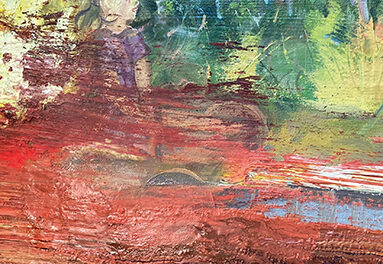8 September 1330, Nativity of Mary
The collective berserk occasioned by the visit of the chanting Benedictines at the Assumption has ebbed at long last, and no one is now shrieking in the cloisters. Much has happened since I last wrote. Sister Heloise has been stripped, shamed, and dispatched by ox to her home in Languedoc, and three volumes of Gregorian chants have been confiscated from the cells of Sisters Hildegard, Brigitte, and Jeanne.
But there was little weeping in the pews this morning: only mewling from homesick postulants and the usual crying fit from Sister Ermelina. After the craze that gripped us in August—the swooning, the toppled haystacks, the bodily awakenings, and the unnatural hot weather that made us forget stockings and wimples—this is a reprieve. Before August we had known no such upheaval at the abbey in many years, perhaps since we received the illuminated manuscript with that dazzling portrait of Saint Anthony. When I searched our library, I could not locate the volume, but I recall that as he knelt to comfort a lamb, his Franciscan robes were hitched to midcalf, his tonsured curls gleamed like a crown of chestnuts, and he had surprisingly thick hair upon his toes.
I have written three letters to Brother Roland since he departed, and burned them all before the ink dried, for I could not get the sentiments right. I wished to tell him how our debates about the nature of the Trinity made me feel—as if I were wearing a hair shirt on my lower half and had boarded a boat, as if I had drunk sour milk and would be sick but pleasantly so—but I could not do so in a way that transcended the fleshly and temporal world, and I think he would be horrified by such an accounting of the female body.
Still, I thank the Lord for this small stretch of quiet, for soon we will bleed again, and all will be in uproar.
9 September 1330, Feast of Saint Ciarán of Clonmacnoise, who trained a fox to carry his papers; the fox later ate them
A man came to the abbey gates today after Lauds with a bag of kittens. He was stout as a barrel and had hair thick upon his pate, so Sister Clotsinda admitted him, although he reeked of ale and could keep little hold on his burlap sack. She brought him to the abbess, as is customary in matters of coin and beast, but when our Mother only gaped at him and placed her hand into her mouth, Clotsinda ferried him to me. I am the sacrist here, entrusted with the tending of our records and books and vestments and vessels and the upkeep of our buildings and grounds. I am librarian and gardener and polisher of brass chalices and dispenser of monthly rags and puzzler of sums and, lately, slayer of rats. This week alone I have killed six—with a broom, with a candlestick, with a trap contrived from wire and cheese, with a well-placed foot.
I was offended that this man—shuffling from foot to foot upon the library threshold, peering with superstition at our shelves of books—thought us unequal to the task of killing rats, as if we are cosseted ladies who leap upon chairs and not hardened brides of the Lord.
But too many slices of brown bread have arrived on my plate half-eaten. So I considered the man’s proposition. Two copper pieces per kitten—he held one up for my inspection, a squiggling ginger tom no bigger than a rat itself—or two gold for the entire sack, which wriggled and clutched in his hands, like bad meat in the belly. Stars of claws jabbed through the burlap, and tiny voices yowled for milk. If I didn’t purchase ’em, the man said with a toothless grin, he’d drown ’em.
He knew well the weakness of women, then, how our innards heave and our eyes dew at miniature versions of things we are used to seeing big: kittens, ponies, rag poppets and their clothing. Even though I am a servant of the Lord and have no comforts and will not produce babes, I am weak in this way. When I was a girl in Normandy, there was a cat I fancied a pet, a fierce ginger with a ragged ear that would bring me slaughtered songbirds and once, from our lord’s field, a green-headed pheasant with feathers I had so wanted for my cap. For that crime—and to teach me not to coddle things and name and love them—my father chased that cat off with a broom and hid the bird’s feathers away in our tick mattress.
Philip, I had called that cat, after a cheesemonger in the village whom I thought handsome—much handsomer than the cobbler—but I had not thought of him in many years. Not until this man brought a satchel of beasts into my library and pressed me to buy them.
“You won’t find a better deal in all of Brittany,” he said and hitched at the bag as I’ve seen men hitch at their loins.
I knew from our annals that the abbey once engaged a man who played a charming tune on the pipe to lure all the rats from our crannies and walls. But in light of the frenzy mere chanting had incited in my sisters this summer, I judged it too risky to engage a man with an instrument. Surely cats would be safer?
While I pondered, the man scanned our shelves. Slack-jawed, he pulled out a volume: a deadly dull book, furred in mold, on the invention of the heavy plow and how men say it transformed the world. No one who could read spines would have chosen it.
“Can you read all this here?” he said, poking a thumb at the book as one would prod a flank of meat to see if it were cooked.
“Yes, and write it in a remarkably fine hand.” Although, I added in my head, I am hopeless at the whorls and saints and great dragon-tailed S’s and F’s a manuscript requires, and all my martyrs to the flame look like parsnips. I blame the scars on my hands, how they stiffen and pang in damp weather.
“That’s some strange magic,” he said, shaking his head, as dolefully as a flagellant. “Women reading.”
I felt a prickle in my throat at that—pride before a man. Such things can get a woman, even a virgin, thrown into a well. I swallowed it and smiled at him as if my head were full of sawdust. “I mostly look at the pictures,” I said.
I tried to simper but my ears boiled. My mother used to say it was the Devil working in me that hid the pitchfork so the neighbor would rage and accuse my father of theft, that overturned pails of goats’ milk so my brother would not eat.
It may have been the Devil in me, but he gave me the genius of a man.
“Can I see them all, please, to see that they have not fleas and worms?” I said to the cat-wrangler. “We have fleas enough here without them coming in on the backs of cats.”
“What difference does an extra flea or two make then?” he said.
“What colors are your cats?” I continued. “Are they ginger or are they mottled as cows? Are they girls or are they boys?”
“What does it matter, if they catch rats?” Spittle swung from his lip.
“It matters to a woman.”
“Well, look upon them,” he said and inverted the bag. A tangle of kittens fell onto the library table—a matting of fur, ginger and gray, tadpole tails and jogging legs. They wriggled and cried and scrambled onto the shelves and across books.
When he realized what he had done, the man tried to catch his cats, but everything had gone topsy-turvy, and they had scurried into the bowels of the nunnery and up habits, and he could do nothing but toddle after them, clutching at tails as uselessly as a man attempting to catch fish with his hands.
10 September 1330, Feast of Saint Pulcheria, empress of the Eastern Roman Empire, who permitted no man to enter her palace
We are inundated with cats. They have upset pots of porridge in the kitchen and snatched chicken legs from dinner plates. They have caused uproar in the schoolroom, where Sister Agnes was trying to teach the newest postulants, orphans from the village, the mysteries of the rosary and how to take one’s seasonal bath. They have set their claws into an eleventh-century volume about transubstantiation, toppled candles in the chapel, and set fire to a seventh-century altar cloth that was very ugly anyway, and, I suspect from the smell, pissed in the nave.
But against their charms the girls are as defenseless as a band of monks on an island in the icy North Sea. They are pats of butter in June. They do nothing now but fuss cats. Ermelina totes the runt around in her habit like a suckling and feeds him from a handkerchief dipped into milk. The orphan-postulants sketch portraits of kittens in baths of sun and kittens with ribbons, and swap them among themselves. Their hands are scored by claws, and their habits are dusted with fur—they have to whisk it from each other before services.
We ought to have dispatched four crates of handkerchiefs, stitched daintily with loaves, fishes, and droplets of Christ’s Blood, to Lille yesterday. I tried to rally the novices to stitching in the solarium this afternoon, but they wriggled and chattered and produced kittens from pockets and would not be still. They speak to these beasts as they would the babes they thought to have before they were given over to the Lord: “My darling, my sweetmeat, my pimpernel, my dove.” Ermelina dissolves into tears when her gray tabby will not be held through midday prayers and scratches her nose in their tussle. Brigitte, who claims to be the bastard of a duke and thus to have a lady’s fragile composition, sniffles and sneezes but will not stop stroking cats.
Rats scuttle in the walls and scamper, brazen as whores, in the rectory, for the cats are too mollycoddled and wee to chase them. But no one is now bothered by rats and their fleas. When I tumble into my hard bed, a ginger tom curls at my feet like a gently snoring snail, and I dream for once not of Brother Roland and our stirring ecclesiastical exchanges but of cats. Tabbies playing pipe organs, and ginger toms on the painted ceilings of faraway Italian chapels, and black-and-white cats nuzzling faces through loaves, and still more cats romping through God’s heavens.
. . .
For more of this story or other great fiction in issue 17.1, order now in our online store. Digital copies are only $5!










